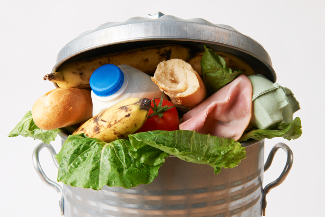Member State Page : Estonia
Last updated on the 29/09/2023

Per capita in 2020: 127 kg of food waste
In total in 2020: 167,000 tonnes of food waste (edible fraction 84,000 tonnes)
In total in 2021: 170 501 tonnes of food waste

Primary production: 23,612 tonnes/year (edible fraction 19,261 tonnes)
Food processing and manufacturing: 31,622 tonnes/year (edible fraction 3,162 tonnes)
Retail and other distribution of food: 19,976 tonnes/year (edible fraction 19,976 tonnes) Restaurants and food services: 10,739 tonnes/year (edible fraction 7,460 tonnes)
Households: 80,564 tonnes/year (edible fraction 33,837 tonnes) or 61 kg food waste per capita/year

National target: To reduce the generation of food losses and waste across the whole food supply chain
Other targets: United Nations Sustainable Development Goal 12.3
Contact point
Target
Estonia is committed to meeting the Sustainable Development Goal Target 12.3 to halve per capita food waste at the retail and consumer level by 2030, and reduce food losses along the food production and supply chains, as part of its national food waste prevention plan.
Measure
The Ministry of Environment commissioned a study to find out the causes and the quantities of food losses and food waste generated in 2020 across the entire Estonian food supply chain. The study was conducted jointly by the Stockholm Environment Institute Tallinn Center (SEI Tallinn) and the Estonian University of Life Sciences according to the methodology set by the Commission Delegated Decision (EU) 2019/1597. Previous food waste studies focused on households and the catering sector (2015), on the processing and manufacturing sectors and the retail and wholesale sectors.
The Ministry of Rural Affairs also commissioned a study to assess the causes and the extent of food losses and food waste in the primary sector, in both agriculture and fisheries (2016–2020, conducted by the Estonian University of Life Sciences). This was a long-term study, conducted consistently in 2016, 2018 and 2020.
Act
Estonia has prepared a national food waste prevention plan that includes different measures involving all key players across the food supply chain. There are six areas of action (with 29 activities) in the food waste prevention plan, covering:
- data collection and measurement of food waste;
- legislative framework and regulatory objectives;
- effective cooperation between different stakeholders and national authorities;
- innovation and R&D;
- food redistribution and
- consistent awareness raising, communication and training.
In the future, the plan will form part of the new national waste management plan (to be developed by the end of 2022), which will be linked to the national circular economy development action plan. The current state waste management plan 2014-2020 (extended until the end of 2022) (Riigi Jäätmekava 2014-2020) lays out the principles of waste management in Estonia and highlights food waste as a serious challenge, without setting any quantitative or qualitative objectives in this regard.
The national long-term strategy Estonia 2035 includes the aims to reduce food waste and to support food redistribution.
The development plan for agriculture and fisheries 2030 foresees that the agricultural and fisheries sectors should adopt the principles of the circular economy and seek to reduce food waste at all stages of the food supply chain. The CAP strategy plan 2021–2027 will also include initiatives that exploit the potential of the bioeconomy, with the aim to valorise bio-residues (including food waste) and by-products as valuable resources.
The Ministry of Social Affairs is working to prevent food waste by improving the food donation and assistance program and has developed a plan for food redistribution.
Awareness raising activities for consumers have been organised by the Ministry of Rural Affairs on the topic of food labelling, including date marking, and further information can be found on the ministry’s dedicated webpage. The Ministry of Environment coordinated a public awareness campaign Austa toitu jäägitult! (‘Respect food completely!’) on food waste prevention focused on households, in the context of the International Day of Awareness of Food Loss and Waste 2020. The same campaign with different focuses continued in 2021 and will take place in the following years as well. Similar actions have been delivered by private sector organizations (examples in the 'Related links and documents' section) and others have been financed under the environmental awareness programme of the Environmental Investment Centre, which supports the development of environmentally friendly consumption habits among Estonian citizens. In the context of the Covid-19 pandemic and due to the tendency of consumers to stockpile food, the Ministry of the Environment offered tips on how to avoid food waste by storing food in a correct way.
The topic of food waste forms part of the educational curriculum and several campaigns and initiatives have been carried out at school level (e.g. ‘Let’s cook together!’).
The circular economy programme (financed through the environmental programme) supports activities that contribute to the prevention of waste, including food waste. The programme ‘Resource efficiency in enterprises’ supports projects that aim to transform surplus food or food co-products into new added-value products.
In 2021 the Ministry of the Environment, the Ministry of Rural Affairs, the Ministry of Social Affairs, Saaremaa Municipality and the Estonian Union of Co-Operative Housing Associations took part in the public sector innovation programme as a team that seeked innovative approaches on how to prevent and reduce food losses and waste in households. This programme gave the opportunity to test and work on new solutions, for example such as reforming date marking on dairy products.
Relevant resources
Links
